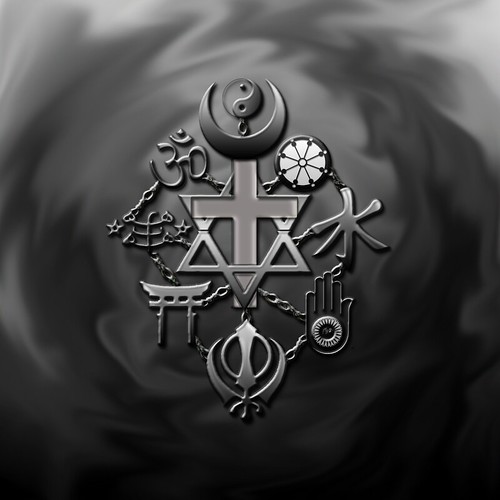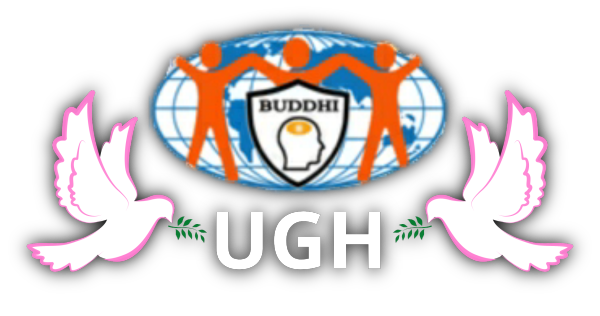UGH Comment:
Use or Misuse of Religion

(Image by uttam sheth)
Are Our Thoughts and Practices Aligned with the True Teachings of God, Religion, or the Guidance of Enlightened Teachers Like Buddha and Mahavira?
For many of us, religion, beliefs, or faith are simply inherited-followed blindly without seeking true understanding.
Our minds, enslaved by traditions, often lead us to think, behave, and act not according to the instruction of religion or the true teachings of enlightened
teachers but based on what tradition has conditioned us to follow.
It's time to free our minds and consciousness from the chains of blind traditions and conditioned thinking.
To truly respect and protect the sanctity of your religion or faith, prevent its misuse, and stop exploitation, take the essential step to investigate and
"Correctly Understand Your Faith and Religion"
Please note:
1. As team members of our organization UGH, we will maintain a neutral stance on religion and teachings of Buddha, or the writings of commentators. We neither endorse nor oppose any specific faith. 2. Our focus is on fostering understanding of religion, aiming to prevent its exploitation and misuse. 3. It's crucial to distinguish between Religious teachings and the teachings of figures like Buddha, Mahavira, or the writings of commentators. • Religion often involves elements of blind faith and adherence to established doctrines. • The teachings of enlightened Gurus / Educators, however, offer valuable guidance for living a fulfilling life and creating a more harmonious and peaceful society.
Read more on 'Use or misuse of religion' in our article here:
Misuse of religion
Understanding Religion
Introduction: "Correctly Understand Your Faith and Religion, Beyond Traditions "
🞳 Explore references from original texts of all religions and faiths at the end!

Start your journey of understanding here:
Most of us inherit religion or faith from our parents, often without seeking a deeper understanding. For believers, having faith without questioning is seen as a cornerstone of religion and the concept of God. However, integrating faith with Correct Awareness (Buddhi)-intellectual clarity and discernment-enables followers to honor their beliefs while gaining a deeper understanding of the essence and purpose of religion/teaching.
In most cases our faith, beliefs, or the religion we have are simply what we inherit from our parents.
'Correct awareness'
When promoting 'Correct Awareness', especially regarding religion, activists, leaders, teachers, and educators, should bear in mind that the root
cause of the misuse and exploitation of religion lies in our ignorance, and in our inherent tendencies to lead or to follow.
In most cases our faith, beliefs, or the religion we have are simply what we inherit from our parents. Blind faith, uncertainty, self-satisfaction,
fear, hope, ethics, and a sense of security during times of uncertainty are some of the foundational elements that contribute to the concept of God and
Religion. Unquestioned 'Faith' serves as the main pillar that sustains the existence of God and Religion.
Believers will need to realize that, in many cases, what we believe in, and the actions we take in the name of God and Religion, or in the preaching of teachers and gurus, are what we like and enjoy; and which may be totally contradictory, and in many cases abusive, to the teachings of God and Religion, and to the preaching of the real teachers and Gurus, that we follow.
Without hurting the faith and sentiments of individuals, campaigns that encourage people to pursue and attain 'Correct Awareness', termed and defined as 'Buddhi'*, can play a pivotal role in helping humans avoid sowing division, nurturing hatred, and inciting hostility in the name of Religion, and in the name of the preaching of Buddha and Gurus
Start your exploration on "Correct Understanding" and Discover more about "Buddhi"
Why is this important?
Fear of the unknown, ethical guidance and a need for comfort and consolation often lead us to religion. Yet, blind traditions and conditioned behaviors can lead to misinterpretation, misuse, and divergence from the core values of both religion and the teachings of enlightened Teachers /Gurus.
Examples of Contradictions in Religious Practices:
1. Mind Alteration:
All religions and enlightened teachers emphasize the importance of maintaining mental clarity and prohibit practices that lead to the aberration of the mind. Though in general, some followers of every religion are often seen indulging in drinking and smoking. Yet, many followers checkmate their religion and enlightened Guides by making selective interpretations to suit personal preferences.
For example:
🞳 Followers of some religions widely drink alcohol but staunchly condemn tobacco.
🞳 Others vehemently condemn alcohol while indulging in tobacco and similar substances.
2. Caste and Creed:
Religions universally preach equality and unity; yet, many still perpetuate caste and creed divisions, directly contradicting the foundational principles of harmony and inclusivity
3. Worship of Buddha:
Buddha did not believe in a deity, heaven, or hell, nor did he ever claim to be a god. Despite his clear teachings (Teaching of Buddha is called Dhamma… meaning 'to uphold)
on the impermanence of self and the path to liberation through inner wisdom, many followers contradict his guidance by:
🞳 Indulging in rituals and practices like appeasing deities.
🞳 Worshipping Buddha as a god, often referring to Buddha as Bhagwan (God).
Notable Point: These contradictions highlight how cultural conditioning and personal preferences often lead followers to selectively interpret religious teachings, allowing them to feel aligned with their faith while simultaneously deviating from its true guidance.
The root cause of:
🞳 Misunderstanding the difference between Religion and Guidance of enlightened teachers
Because human mind and consciousness is enslaved to cultural traditions and practices, making it difficult to perceive, interpret, and understand the truth, let alone act wisely.
🞳 Misuse, Contradiction and divergence of Religion and faith
Based on our traditional cultural conditioning we human tend to make interpretation of religion and the guidance what is suitable to our personal liking, preferences and what we already believe.
Educators and leaders can promote the understanding of all Religions thru Buddhi
The Role of Educators and Leaders:
The challenging task for educators is to help people understand the difference between teachings of the enlightened teachers and gurus, and the concept of God and Religion.
Educators and leaders can promote Correct Awareness (Buddhi) to:
✅ Prevent misuse and exploitation of religion.
✅ Preserve the sanctity of teachings.
✅ Align actions with the true purpose of religion and enlightened guidance.
✅ Avoid blind following religious leaders, and critically examine teachings to distinguish between genuine and deceptive figures.
It is essential for everyone to make a personal effort to investigate and properly understand one's own Religion thereby preventing its exploitation and misuse and preserving its sanctity.
The Issue: Blind Following
"Why do many, seemingly intelligent, CEOs, politicians, high-ranking government officials and many individuals, from all walks of life, become followers of these charlatans - some even start worshipping these deceptive figures - these fake Gurus and fake Babas?"
UGH article: Real vs. Fake Gurus…Examine here.
Conclusion
Religious faith is a powerful thing. It may bring to an individual great joy, and may bring great comfort in times of sorrow or need; however, Religion is often misused for purely power-political goals including war; it is the resposibility of the individual to understand what is true, in all things and all people. This can be achieved by using the power within the concept of 'Buddhi'.
Religion is often misused for power or political goals. By embracing 'Correct Awareness' through Buddhi and seeking true understanding, we can preserve the sanctity of faith and align our actions with its genuine teachings.
Do not be afraid to question; keep an open inquisitive mind in all things.
A Call to Action:
Let us break free from blind following and embrace true understanding by starting your journey of transformation.
Start your journey of transformation: Free your mind with Buddhi.
"Religion is often misused for power or political goals, including war." - David Dashwood, UGH contributor
Read more: UGH Article - Misuse of Religion.
Supporting Texts from your Religions/Faith:
Check the references from the original texts of all religions and the guidance of enlightened teachers, clearly instructing on Truly Understanding your religion or faith.
Sanatan Dharma
Bhagavad Gita 4.38
The Bhagavad Gita emphasizes self-realization and the pursuit of knowledge as the ultimate purifier of the mind.
"Na hi jñānena sadṛśaṁ pavitram iha vidyate;
Tat svayaṁ yoga-saṁsiddhaḥ kālena ātmani vindati"
Translation:
"In this world, there is nothing so purifying as knowledge. He who becomes perfected in yoga finds it within himself in due course of time."
- Swami Sivananda, Eknath Easwaran, and A.C. Bhaktivedanta Swami Prabhupada (Bhagavad Gita: As It Is)
Katha Upanishad 1.2.23
"Nāyamātmā balahīnena labhyaḥ
Na ca pramādāt tapaso vāpy aliīgāt
Etair upāyair yatate yas tu vidvāṁs
Tasyaiṣa ātmā viśate brahma-dhāma."
Translation:
" The Self cannot be realized by those who are weak in will or resolve.
It is not attained by the careless or by those who lack self-control and proper understanding.
However, a wise and disciplined seeker, through determined effort and appropriate means, realizes the Self and enters the realm of Brahman (ultimate reality)."
Meaning: Personal effort and understanding bring clarity, preventing misuse.
Judaism
Deuteronomy 6:7:
"You shall teach them diligently to your children, and shall talk of them when you sit in your house, and when you walk by the way, and when you lie down, and when you rise up."
From the Tanakh (Jewish Publication Society) or King James Bible.
Relevance: Proper teaching ensures the preservation of truth.
Jainism
Acharanga Sutra:
"Se eso appāṇo pāṇāṇo, je bhūyaṁ prāṇāṇaṁ tiṭṭhati."
"Jo nāṇaṁ ṇāṇaṁ na sevati, so na sevai paḍivattiṁ."
Translation:
"One who neglects or disregards the existence of earth, air, fire, water, and vegetation disregards his own existence, which is entwined with them."
Hermann Jacobi, Sacred Books of the East, Volume 22; edited by Max Müller
Meaning: Awareness and respect for all existence are vital to understanding self.
Buddhism
Kalama Sutta:
"Mā anussavena, mā paramparāya, mā itikirāya, mā piṭakasampadānena, mā takkahetu, mā nayahetu, mā ākāraparivitakkena, mā diṭṭhinijjhānakkhantiyā, mā bhabbarāpatāya, mā samaṇo no garūti.
Yadā tumhe, Kālāma, attañca dhammañca evaññ?ssatha: 'Ime dhamm? kusalā, ime dhammā akusalā; ime dhammā sāvajjā, ime dhammā
anavajjā; ime dhammā sevitabbā, ime dhammā na sevitabbā.'
Ti, tato tumhe, Kālāma, patisankhā yoniso khayāya vā nirodhāya vā paṭipajjathāti."
Anguttara Nikaya (A.I.188-193) in the Pali Canon of Theravada Buddhism.
Translation:
"Do not go upon what has been acquired by repeated hearing, nor upon tradition, nor upon rumor. When you yourselves know: 'These things are good;
these things are blameless,' enter and abide in them."
Translation by Ven. Soma Thera or Thanissaro Bhikkhu.
The Kalama Sutta emphasizes the importance of personal investigation and direct understanding. It encourages individuals not to accept teachings based on authority or tradition alone but to critically examine and adopt what leads to benefit and well-being.
Relevance: Encourages personal investigation over blind faith.
Dhammapada
Verse 282:
"Yogā ve jayatī bhūri, ayogā bhūrisaṅkhayo;
Etaṁ dvedhā pathaṁ ñatvā, bhavāya vibhavāya ca,
Tathāttānaṁ niveseyya, yathā bhūri pavaḍḍhati."
Translation:
Wisdom springs from meditation; without meditation, wisdom wanes. Having known these two paths of progress and decline, let a man so conduct
himself that his wisdom may increase."
Translation by Eknath Easwaran or Ven. Narada Thera.
Christianity
"Πάντα δοκιμάζετε, τό καλόv κατέχετε."
Translation:
Test everything; hold fast to what is good. Translation (Bible - New International Version - NIV)
Prove all things; hold fast that which is good. Translation (Bible - King James Version - KJV)
Relevance: Critical evaluation protects against manipulation.
Islam
Original Arabic Text:

"And pursue not that of which you have no knowledge; for every act of hearing, or of seeing, or of (feeling in) the heart will be enquired into (on the Day of Reckoning)". Translation (Abdullah Yusuf Ali):
"And do not pursue that of which you have no knowledge. Indeed, the hearing, the sight, and the heart-about all those [one] will be questioned." Translation (Saheeh International):
"Follow not that whereof thou hast no knowledge. Lo! the hearing and the sight and the heart-of each of these it will be asked." Translation (Muhammad Marmaduke Pickthall):



